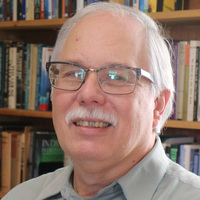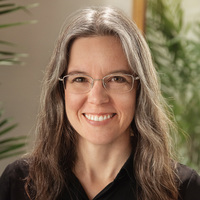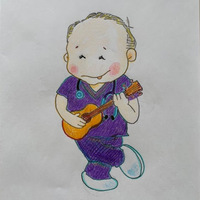
Alexander Moreira-Almeida
Alexander Moreira-Almeida, MD, PhD is Professor of Psychiatry at the Federal University of Juiz de Fora (UFJF) School of Medicine and Founder and Director of the Research Center in Spirituality and Health, Brazil. Chair of the Section on Spirituality of the Latin American Psychiatric Association (APAL). Founding chair of the section on spirituality of the Brazilian Psychiatric Association (2014-21). Former chair of the Sections on Religion, Spirituality and Psychiatry of the World Psychiatric Association (WPA) (2014-21) when coordinated the WPA Position Statement on Spirituality and Religion in Psychiatry. He obtained a medical degree at UFJF and trained in psychiatry and cognitive-behavioral therapy at the Institute of Psychiatry of the University of São Paulo, Brazil, where he also obtained his PhD in Health Sciences. Formerly a postdoctoral fellow in religion and health at Duke University. Author of more than 190 papers published in peer-reviewed journals and book chapters that received more than 8,500 citations, h index 48 (Google Scholar). More than 550 presentations at academic meetings, including 160 abroad in 19 countries. More than 400 interviews to lay media. Coordination of TV NUPES, a YouTube channel on science, health and spirituality with more than 300 videos and 1,1 mi views in 100 countries. Editor of the book "Spirituality and Mental Health Across Cultures" (Oxford Univ Press, 2021) and coauthor of "Science of Life After Death" (Springer, 2022). His main research interests involve the exploration of the association between religiosity and health as well as empirical studies of spiritual experiences, especially their implication for the mind-brain problem, as well as the methodology, history and epistemology of this research field.
Supervisors: Harold Koenig and Francisco Lotufo Neto
Address: Universidade Federal de Juiz de Fora - UFJF
School of Medicine
Av. Eugênio do Nascimento s/n – Bairro Dom Bosco
36036-330 Juiz de Fora - MG
Brazil
Supervisors: Harold Koenig and Francisco Lotufo Neto
Address: Universidade Federal de Juiz de Fora - UFJF
School of Medicine
Av. Eugênio do Nascimento s/n – Bairro Dom Bosco
36036-330 Juiz de Fora - MG
Brazil
less
Related Authors
Bruce Greyson
University of Virginia
Sharon Hewitt Rawlette
New York University
InterestsView All (6)








Uploads
Books by Alexander Moreira-Almeida
Featured topics of coverage include:
The belief in life after death in the contemporary world as well as in the history of religions and philosophy.
The key misguided arguments and prejudices against the academic study of afterlife survival.
What constitutes empirical evidence for survival after death?
The main explanatory hypotheses alternative to survival after death.
The chief cultural barriers to a fair examination of the available evidence for survival of consciousness after death.
Science of Life After Death is an essential resource for researchers, professors, and graduate students as well as clinicians, therapists, and other professionals in developmental and clinical psychology; spirituality, religious. and consciousness studies; psychiatry; neuroscience / neurology; phenomenology / philosophy; complementary and alternative medicine; and all interrelated disciplines.
Exploring Frontiers of the Mind-Brain Relationship argues against the purely physical analysis of consciousness and for a balanced psychobiological approach. This thought-provoking volume bridges philosophy of mind with science of mind to empirically examine transcendent phenomena, such as mystic states, near-death experiences and past-life memories, that have confounded scientists for decades. Representing disciplines ranging from philosophy and history to neuroimaging and physics, and boasting a panel of expert scientists and physicians, including Andrew Newberg, Peter Fenwick, Stuart Hameroff, Mario Beauregard, Deepak Chopra, and Chris Clarke the book rigorously follows several lines of inquiry into mind-brain controversies, challenging readers to form their own conclusions—or reconsider previous ones. It is essential reading for researchers and clinicians across many disciplines, including cognitive psychology, personality and social psychology, the neurosciences, neuropsychiatry, palliative care, philosophy, and quantum physics.
“This book … brings together some precious observations about the fundamental mystery of the nature of consciousness … It raises many questions that serve to invite each of us to be more aware of the uncertainty of our preconceptions about consciousness … This book on the frontiers of mind-body relationships is a scholarly embodiment of creative and open-minded science.”
C. Robert Cloninger, MD
Wallace Renard Professor of Psychiatry, Genetics, and Psychology
Washington University School of Medicine
St. Louis MO
“Although dogmatic materialism is the monarch of contemporary Western philosophy and science, contributors to this splendid book remind me of the brash lad in the classic fable who shouted, "But the emperor has no clothes!" Some readers will agree with this observation while others will find it an outrageous heresy. But as they wend their way through each articulately stated and meticulously argued chapter, they will never succumb to boredom. It is the type of book that will haunt its readers long after the last chapter is read.”
Stanley Krippner, Ph.D.
Professor of Psychology, Saybrook University
Co-editor, Debating Psychic Experience: Human Potential or Human Delusion?
----
“This is really a thorough and up-to-date study of so-called anomalous spiritual phenomena. Instead of reducing these phenomena into exceptions to the general rule, the authors do not hesitate to widen the frame of interpretation. As is argued against a naïve epistemological stance, their open-minded inquiry is really a challenge and the authors managed to give us a fruitful perspective on their scholarly and multidisciplinary well documented efforts. I recommend this book to all psychiatrists, as well as professionals in theology and psychology of religion.”
Peter J. Verhagen, M.D.
Psychiatrist
Chair of the World Psychiatric Association Section on Religion, Spirituality and Psychiatry
----
“It has become almost of a mantra in recent years to repeat that consciousness and mind are caused by brain processes and that it is only a matter of time before the neurosciences reveal all there is to know about them. As this important book shows, the fact that we now know a lot more about brain correlates of mental processes has not changed a number of awkward problems for a purely materialistic account of the mind, including how to solve the hard problem of consciousness and explain ordinary processes such as memory or less ordinary processes such as apparent psi phenomena. The contributors to this volume cover the essential areas in this discussion (philosophy, history, contemporary neuroscience, physics, and various anomalous experiences) and provide a cogent and scientifically based discussion that evidences that mind-brain relationships are far from definitely “explained” or obvious as a number of materialist authors have opined recently.”
Etzel Cardeña, Ph.D.
Thorsen Professor, Lund University, Sweden
Co-editor of Altering Consciousness: A Multidisciplinary Perspective and Varieties of Anomalous Experience.
Papers by Alexander Moreira-Almeida
Academic investigation of thousands of children who claim past-life memories has been developed worldwide for five decades. However, despite the scientific and clinical significance of this substantial body of research, most clinicians and scientists are not aware of it. This study aims to report a case of a child who claimed memories that match his deceased granduncle's life and to perform a literature review of the main characteristics and implications of children's past-life claims.
Method
We investigated the case through interviews with the child and first-hand witnesses, and conducted a documental analysis to verify possible associations between the child's statements and facts from the deceased's life. We also performed a CT scan of the child's skull to verify possible associations between anatomical features and a fatal wound from the alleged previous life.
Results
The child presented most key features typical of such cases of claimed past-life memories. He made 13 statements about the previous life; nine were correct (e.g., the mode of death and a toy the granduncle had) and four were undetermined. The child demonstrated eight unusual behaviors that matched the previous personality´s habits, interests, and manners. The child has a birth defect (a rare occipital concavity) that is compatible with the firearm injury that caused the death of his uncle.
Conclusions
The characteristics of the reported case fit the cross-cultural patterns of children who claim past-life memories, and it has scientific and clinical implications that need to be better known and investigated.
Keywords
Featured topics of coverage include:
The belief in life after death in the contemporary world as well as in the history of religions and philosophy.
The key misguided arguments and prejudices against the academic study of afterlife survival.
What constitutes empirical evidence for survival after death?
The main explanatory hypotheses alternative to survival after death.
The chief cultural barriers to a fair examination of the available evidence for survival of consciousness after death.
Science of Life After Death is an essential resource for researchers, professors, and graduate students as well as clinicians, therapists, and other professionals in developmental and clinical psychology; spirituality, religious. and consciousness studies; psychiatry; neuroscience / neurology; phenomenology / philosophy; complementary and alternative medicine; and all interrelated disciplines.
Exploring Frontiers of the Mind-Brain Relationship argues against the purely physical analysis of consciousness and for a balanced psychobiological approach. This thought-provoking volume bridges philosophy of mind with science of mind to empirically examine transcendent phenomena, such as mystic states, near-death experiences and past-life memories, that have confounded scientists for decades. Representing disciplines ranging from philosophy and history to neuroimaging and physics, and boasting a panel of expert scientists and physicians, including Andrew Newberg, Peter Fenwick, Stuart Hameroff, Mario Beauregard, Deepak Chopra, and Chris Clarke the book rigorously follows several lines of inquiry into mind-brain controversies, challenging readers to form their own conclusions—or reconsider previous ones. It is essential reading for researchers and clinicians across many disciplines, including cognitive psychology, personality and social psychology, the neurosciences, neuropsychiatry, palliative care, philosophy, and quantum physics.
“This book … brings together some precious observations about the fundamental mystery of the nature of consciousness … It raises many questions that serve to invite each of us to be more aware of the uncertainty of our preconceptions about consciousness … This book on the frontiers of mind-body relationships is a scholarly embodiment of creative and open-minded science.”
C. Robert Cloninger, MD
Wallace Renard Professor of Psychiatry, Genetics, and Psychology
Washington University School of Medicine
St. Louis MO
“Although dogmatic materialism is the monarch of contemporary Western philosophy and science, contributors to this splendid book remind me of the brash lad in the classic fable who shouted, "But the emperor has no clothes!" Some readers will agree with this observation while others will find it an outrageous heresy. But as they wend their way through each articulately stated and meticulously argued chapter, they will never succumb to boredom. It is the type of book that will haunt its readers long after the last chapter is read.”
Stanley Krippner, Ph.D.
Professor of Psychology, Saybrook University
Co-editor, Debating Psychic Experience: Human Potential or Human Delusion?
----
“This is really a thorough and up-to-date study of so-called anomalous spiritual phenomena. Instead of reducing these phenomena into exceptions to the general rule, the authors do not hesitate to widen the frame of interpretation. As is argued against a naïve epistemological stance, their open-minded inquiry is really a challenge and the authors managed to give us a fruitful perspective on their scholarly and multidisciplinary well documented efforts. I recommend this book to all psychiatrists, as well as professionals in theology and psychology of religion.”
Peter J. Verhagen, M.D.
Psychiatrist
Chair of the World Psychiatric Association Section on Religion, Spirituality and Psychiatry
----
“It has become almost of a mantra in recent years to repeat that consciousness and mind are caused by brain processes and that it is only a matter of time before the neurosciences reveal all there is to know about them. As this important book shows, the fact that we now know a lot more about brain correlates of mental processes has not changed a number of awkward problems for a purely materialistic account of the mind, including how to solve the hard problem of consciousness and explain ordinary processes such as memory or less ordinary processes such as apparent psi phenomena. The contributors to this volume cover the essential areas in this discussion (philosophy, history, contemporary neuroscience, physics, and various anomalous experiences) and provide a cogent and scientifically based discussion that evidences that mind-brain relationships are far from definitely “explained” or obvious as a number of materialist authors have opined recently.”
Etzel Cardeña, Ph.D.
Thorsen Professor, Lund University, Sweden
Co-editor of Altering Consciousness: A Multidisciplinary Perspective and Varieties of Anomalous Experience.
Academic investigation of thousands of children who claim past-life memories has been developed worldwide for five decades. However, despite the scientific and clinical significance of this substantial body of research, most clinicians and scientists are not aware of it. This study aims to report a case of a child who claimed memories that match his deceased granduncle's life and to perform a literature review of the main characteristics and implications of children's past-life claims.
Method
We investigated the case through interviews with the child and first-hand witnesses, and conducted a documental analysis to verify possible associations between the child's statements and facts from the deceased's life. We also performed a CT scan of the child's skull to verify possible associations between anatomical features and a fatal wound from the alleged previous life.
Results
The child presented most key features typical of such cases of claimed past-life memories. He made 13 statements about the previous life; nine were correct (e.g., the mode of death and a toy the granduncle had) and four were undetermined. The child demonstrated eight unusual behaviors that matched the previous personality´s habits, interests, and manners. The child has a birth defect (a rare occipital concavity) that is compatible with the firearm injury that caused the death of his uncle.
Conclusions
The characteristics of the reported case fit the cross-cultural patterns of children who claim past-life memories, and it has scientific and clinical implications that need to be better known and investigated.
Keywords
Why is it important to study mediumship?
Study on the fit and accuracy of Chico Xavier's mediumistic writing.
Based on the paper:
Rocha AC, Paraná D, Freire ES, Lotufo Neto F, Moreira-Almeida A. Investigating the fit and accuracy of alleged mediumistic writing: a case study of Chico Xavier's letters. Explore 10(5):300-8, 2014.
http://www.ncbi.nlm.nih.gov/pubmed/25103071
Postdoctoral study of Alexandre Caroli Rocha and Denise Paraná at USP - University of Sao Paulo, in collaboration with UFJF - Federal University of Juiz de Fora, supported by a grant from Fapesp - Sao Paulo Research Foundation
TV NUPES' mission is to produce and disseminate accessible and reliable information on the relationship between spirituality, science and health.
NUPES's mission is to develop interdisciplinary research about the relationship between spirituality and health. It works with a wide network of national and international researchers to allow NUPES to be an international research center of reference in spirituality and health. In addition to constant publication in scientific journals and books, conferences, and mentoring of graduate students, NUPES also provides updated and reliable information to the public, through interviews and articles in lay media.
NUPES (Research center in spirituality and health) was founded in 2007 and is integrated to the Graduate Program in Health from the School of Medicine of Federal University of Juiz de Fora (UFJF], Brazil.
http://www.ufjf.br/nupes-eng/
What is the importance of studying NDEs?
What are the scientific explanations for NDEs?
Profile of academic papers on Near Death Experiences
Guidelines for future research on NDE
What is the importance of studying NDEs?
What are the scientific explanations for NDEs?
Does science imply in materialism?
What is materialist scientism?
Which religious dimensions have been most investigated?
Religious affiliation, coping, organizational, private, subjective, intrinsic and extrinsic religiosity.
Would patients wish their religiosity to be addressed? Reasons for this gap in clinical practice?